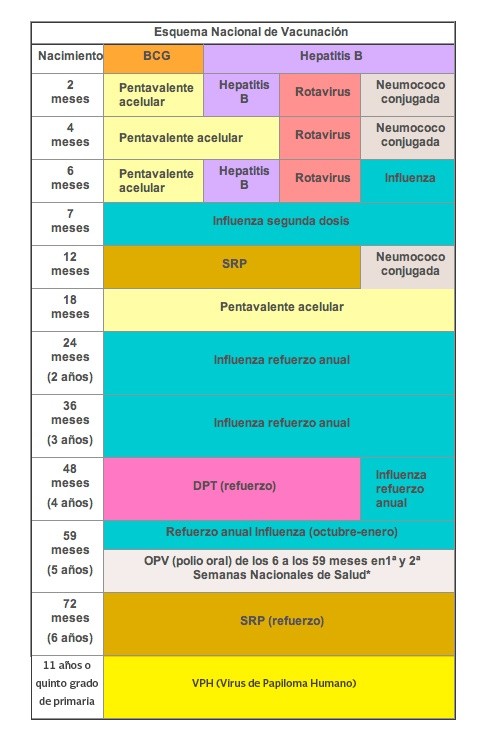What to do if your child wasn't vaccinated on time? IMSS guide for parents


It is essential to complete all vaccination schedules to prevent disease and protect health. IMSS
The Mexican Social Security Institute (IMSS) has a vaccination schedule that protects against multiple infectious diseases throughout all stages of life, from birth to old age.
READ: IMSS denies image of patients on the floor of Clinic 15 in PueblaThis scheme is part of the PrevenIMSS program , which is designed to provide comprehensive preventive care to people of all ages, including children, adolescents, adults, and seniors.
For children:- Rotavirus: Two doses at 2 and 4 months, and a booster dose at 12 months.
- Seasonal influenza: One dose per year from 6 months to 5 years.
- MMR (measles, rubella, mumps): The first dose at 12 months and the second at 6 years.
- Hexavalent (diphtheria, whooping cough, tetanus, Haemophilus influenzae type b, polio): Doses at 2, 4 and 6 months, and a booster at 18 months.
- Pneumococcus: Doses at 2, 4, 6 and 12 months.

- Seasonal influenza: Annual from 6 months.
- Diphtheria, pertussis, and tetanus (DPT): Boosters at ages 4, 12, and 18, and every 10 years thereafter.
- MMR booster (measles, rubella, mumps): At age 6.
- Tetanus-diphtheria (Td): Booster every 10 years.

- Seasonal influenza: Annual from age 65.
- Pneumococcal polysaccharide: From age 65, with revaccination every 5 years.
- Tetanus-diphtheria (Td): Booster every 10 years.
- Tetanus-diphtheria (Td): Td vaccination during pregnancy to protect the baby from whooping cough.
- Seasonal influenza: Annual vaccination is recommended.
It is important to consult with your doctor for more information on the appropriate vaccination schedule for each case.
What to do if you or your child didn't receive a vaccine on time?If you or your daughter or son have not received any vaccine at the indicated time, Go to the nearest Health Unit as soon as possible with the corresponding National Health Card. There, medical staff will guide you and administer the necessary vaccinations according to the current schedule.
It is essential to complete all vaccination schedules to prevent diseases and protect health.
If you don't have your National Health Card, you can go to your local Health Unit, where they will provide you with information and help you replace it.
Recommendations for taking your daughter or son to be vaccinated- Keep calm. Your attitude directly influences how your daughter or son will feel.
- Before getting vaccinated, talk to your healthcare provider about the benefits and possible side effects of the vaccines.
- Explain in simple words what is going to happen. Don't lie to him or hide information, even if he's little, he can understand if you speak to him clearly.
- Let him know it might hurt a little. , but it will be something quick and necessary for your well-being.
- Avoid using threats or negative comments such as, "If you misbehave, they'll vaccinate you," or "You poor thing, look what they're doing to you." Don't minimize their emotions by asking them not to cry or to "suck it up."
- If he cries, accompany him with understanding. Explain that it's normal to feel scared, but that they're in good hands and that you're doing this for their health.
- Make sure that vaccination is carried out in a calm and familiar environment. If possible, take him to the medical unit where he normally receives care.
- Stay with him or her throughout the entire process. Your presence is important to reduce their anxiety. If you think you might become anxious, consider asking a family member to accompany them.
- If you promise a gift after the vaccine, keep it. This builds confidence.
- When you finish, hug him/her, show him/her affection and make him feel proud of having been brave.
- Plan a fun activity afterward. This can help you associate vaccination with a positive experience.
- Listen carefully to the instructions of the health personnel and follow the recommendations to the letter.
These actions not only make the moment of vaccination more bearable, but also contribute to creating a positive experience that facilitates future medical visits.
EE
Registration implies acceptance of the Terms and Conditions
informador





